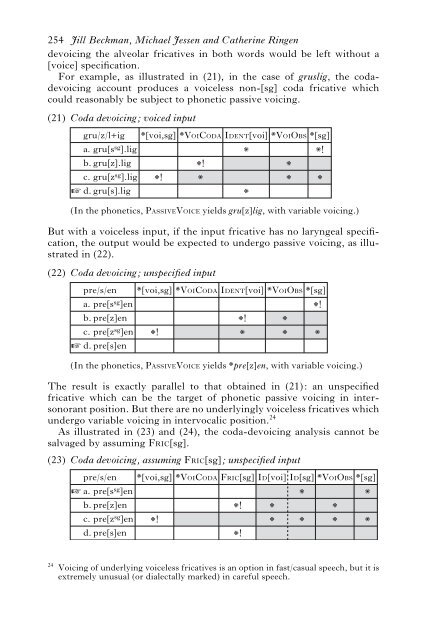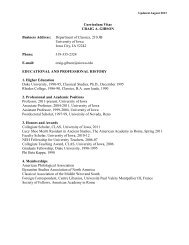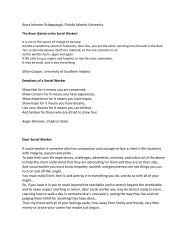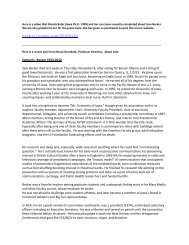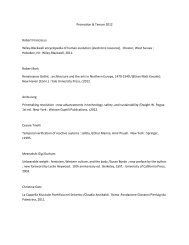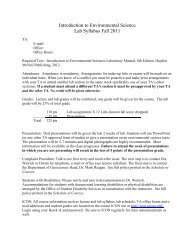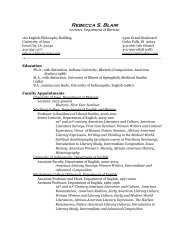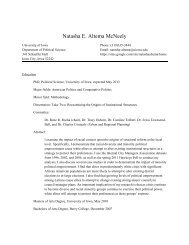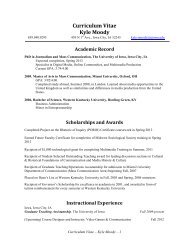German fricatives: coda devoicing or positional faithfulness?
German fricatives: coda devoicing or positional faithfulness?
German fricatives: coda devoicing or positional faithfulness?
You also want an ePaper? Increase the reach of your titles
YUMPU automatically turns print PDFs into web optimized ePapers that Google loves.
254 Jill Beckman, Michael Jessen and Catherine Ringen<br />
<strong>devoicing</strong> the alveolar <strong>fricatives</strong> in both w<strong>or</strong>ds would be left without a<br />
[voice] specification.<br />
F<strong>or</strong> example, as illustrated in (21), in the case of gruslig, the <strong>coda</strong><strong>devoicing</strong><br />
account produces a voiceless non-[sg] <strong>coda</strong> fricative which<br />
could reasonably be subject to phonetic passive voicing.<br />
(21)<br />
Coda <strong>devoicing</strong>; voiced input<br />
gru/z/l+ig *[voi,sg] *VoiCoda Ident[voi] *VoiObs<br />
a. gru[ssg].lig<br />
*<br />
b. gru[z].lig<br />
*!<br />
*<br />
c. gru[zsg].lig *! *<br />
*<br />
d. gru[s].lig<br />
*<br />
*[sg]<br />
*!<br />
(In the phonetics, PassiveVoice yields gru[z]lig, with variable voicing.)<br />
But with a voiceless input, if the input fricative has no laryngeal specification,<br />
the output would be expected to undergo passive voicing, as illustrated<br />
in (22).<br />
(22)<br />
Coda <strong>devoicing</strong>; unspecified input<br />
pre/s/en<br />
a. pre[ssg]en<br />
b. pre[z]en<br />
c. pre[zsg]en<br />
d. pre[s]en<br />
*[voi,sg] *VoiCoda Ident[voi] *VoiObs<br />
*!<br />
(In the phonetics, PassiveVoice yields *pre[z]en, with variable voicing.)<br />
*!<br />
*<br />
*<br />
*<br />
*<br />
*[sg]<br />
*!<br />
The result is exactly parallel to that obtained in (21): an unspecified<br />
fricative which can be the target of phonetic passive voicing in interson<strong>or</strong>ant<br />
position. But there are no underlyingly voiceless <strong>fricatives</strong> which<br />
undergo variable voicing in intervocalic position.24<br />
As illustrated in (23) and (24), the <strong>coda</strong>-<strong>devoicing</strong> analysis cannot be<br />
salvaged by assuming FRIC[sg].<br />
(23)<br />
Coda <strong>devoicing</strong>, assuming Fric[sg]; unspecified input<br />
pre/s/en<br />
a. pre[ssg]en<br />
b. pre[z]en<br />
c. pre[zsg]en<br />
d. pre[s]en<br />
*[voi,sg] *VoiCoda Fric[sg] Id[voi]<br />
*!<br />
*!<br />
*!<br />
*<br />
*<br />
Id[sg]<br />
*<br />
*<br />
*<br />
*VoiObs<br />
*<br />
*<br />
*[sg]<br />
*<br />
*<br />
24 Voicing of underlying voiceless <strong>fricatives</strong> is an option in fast/casual speech, but it is<br />
extremely unusual (<strong>or</strong> dialectally marked) in careful speech.


